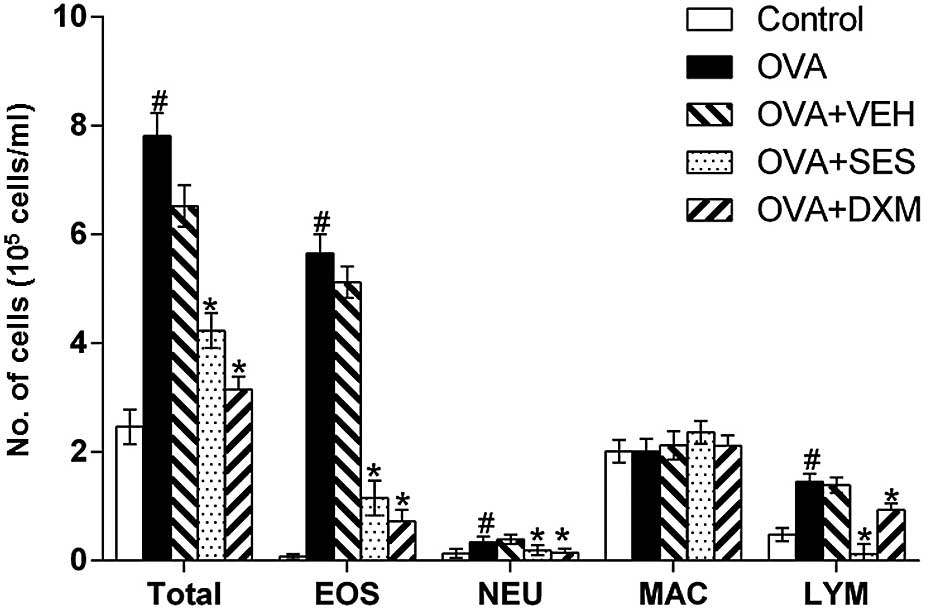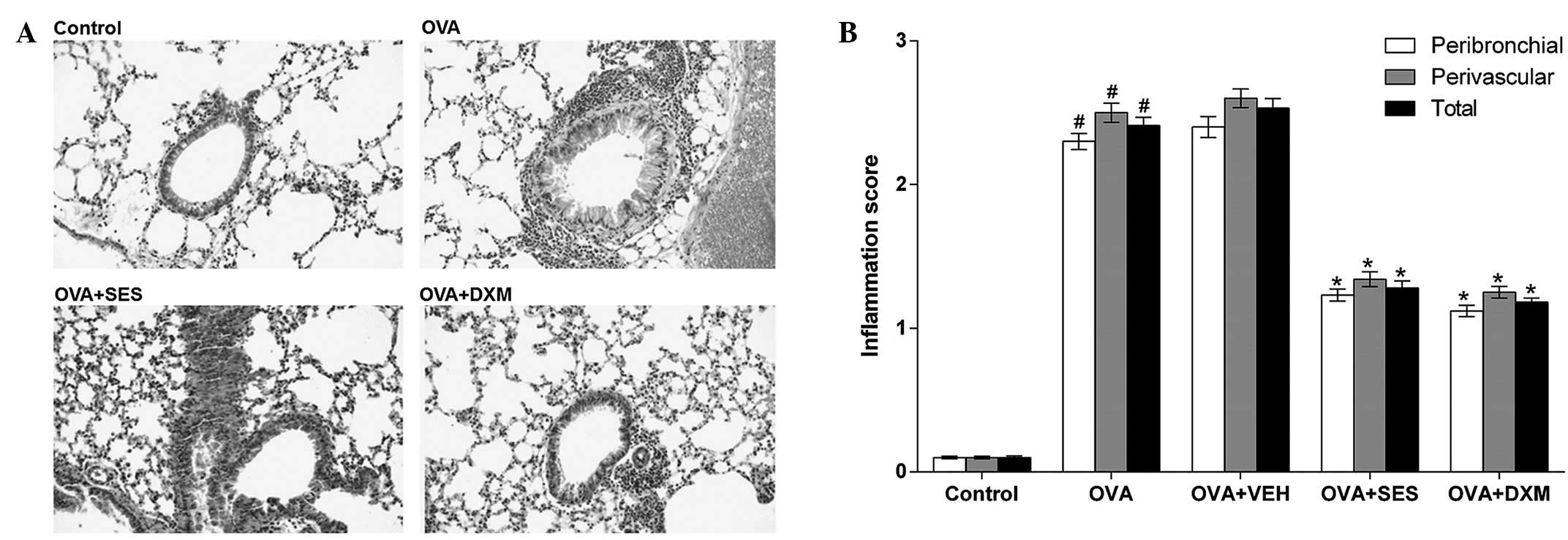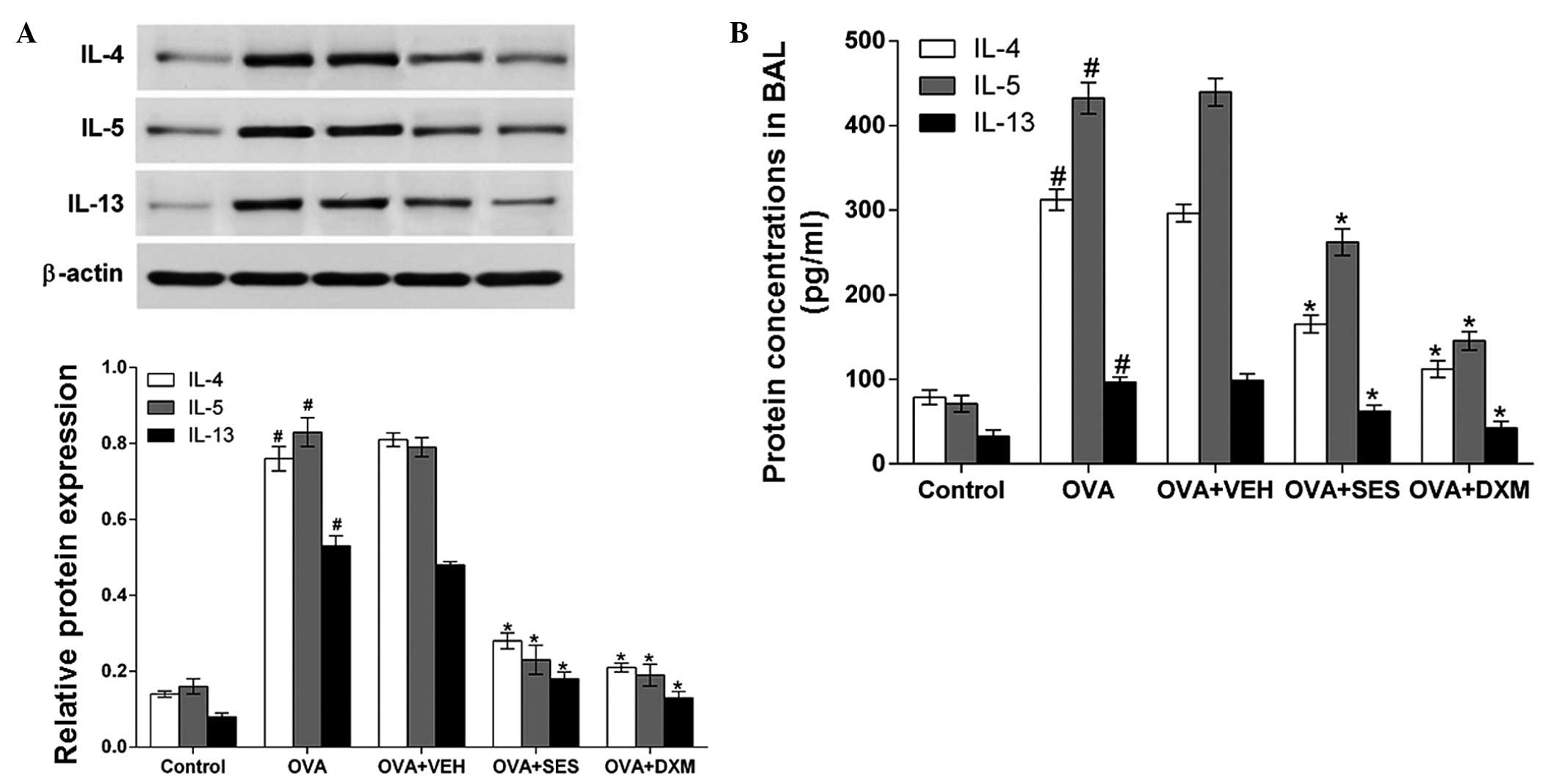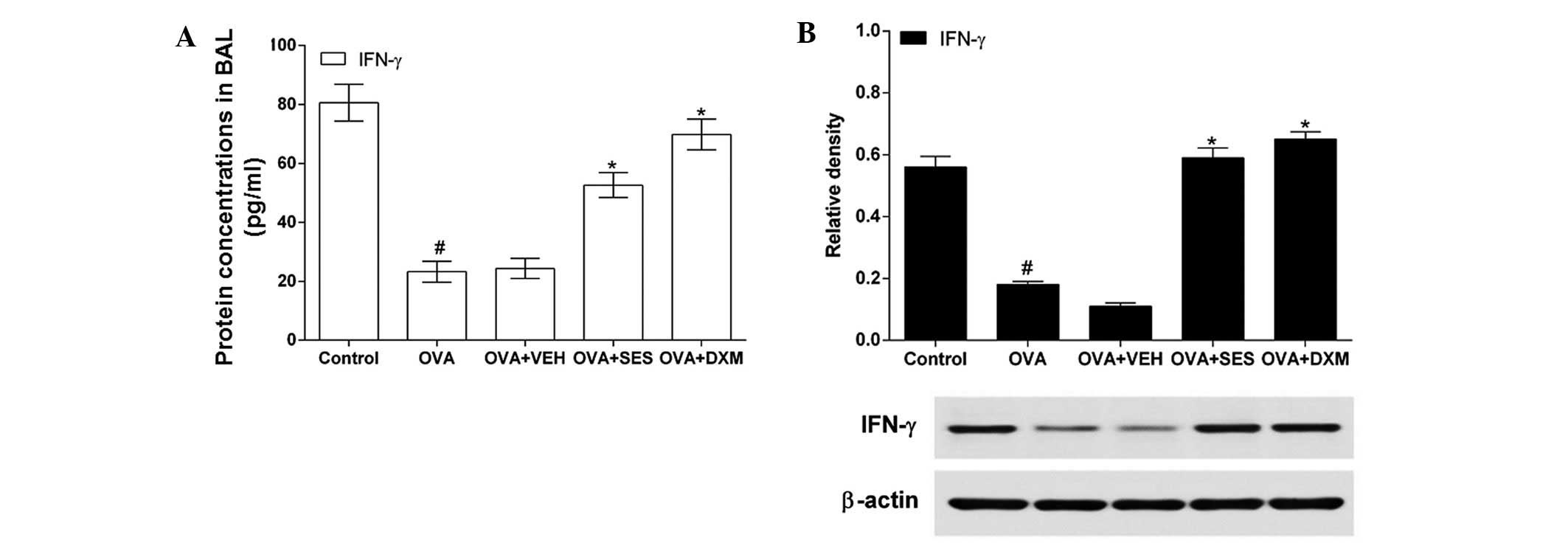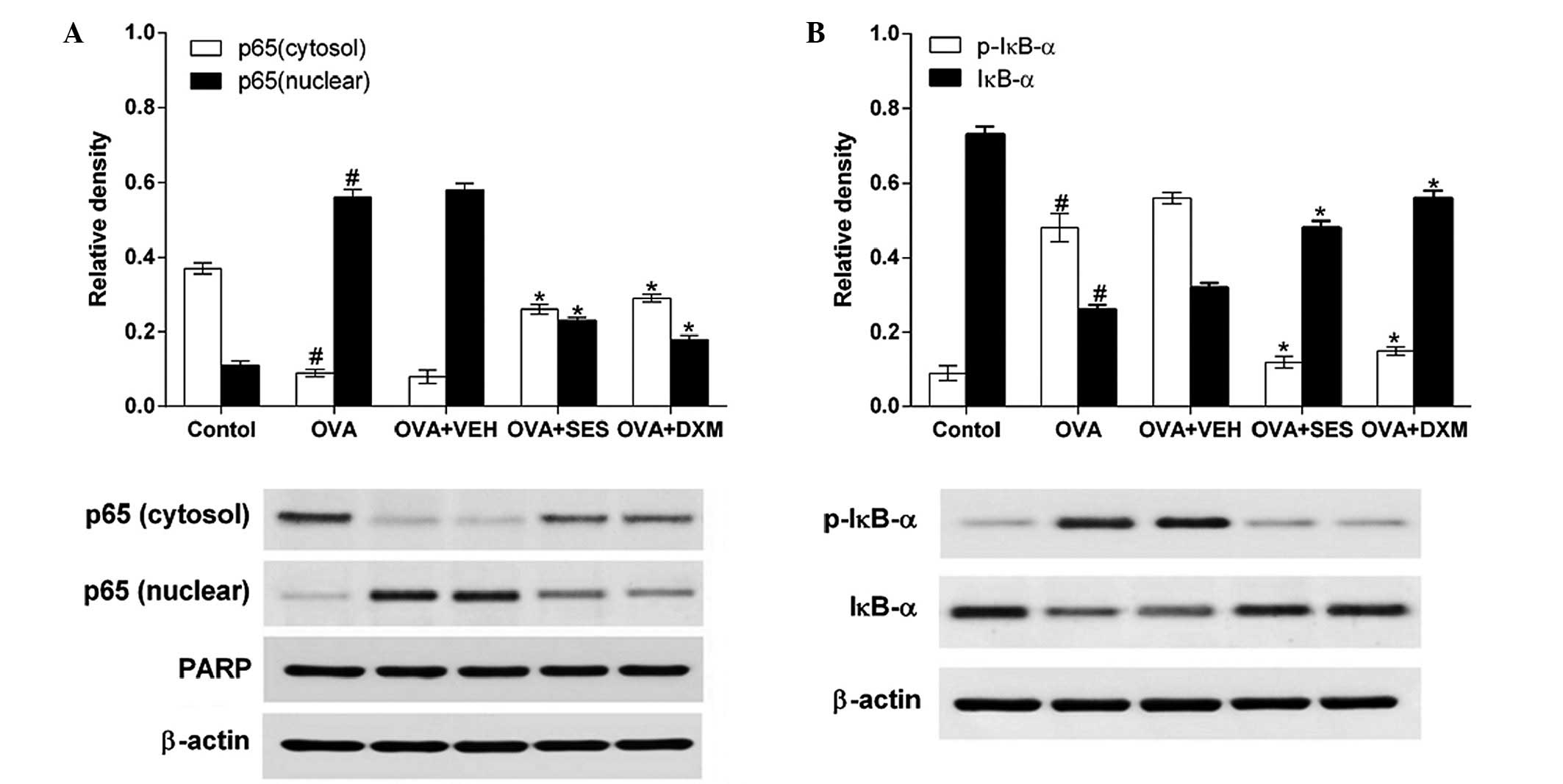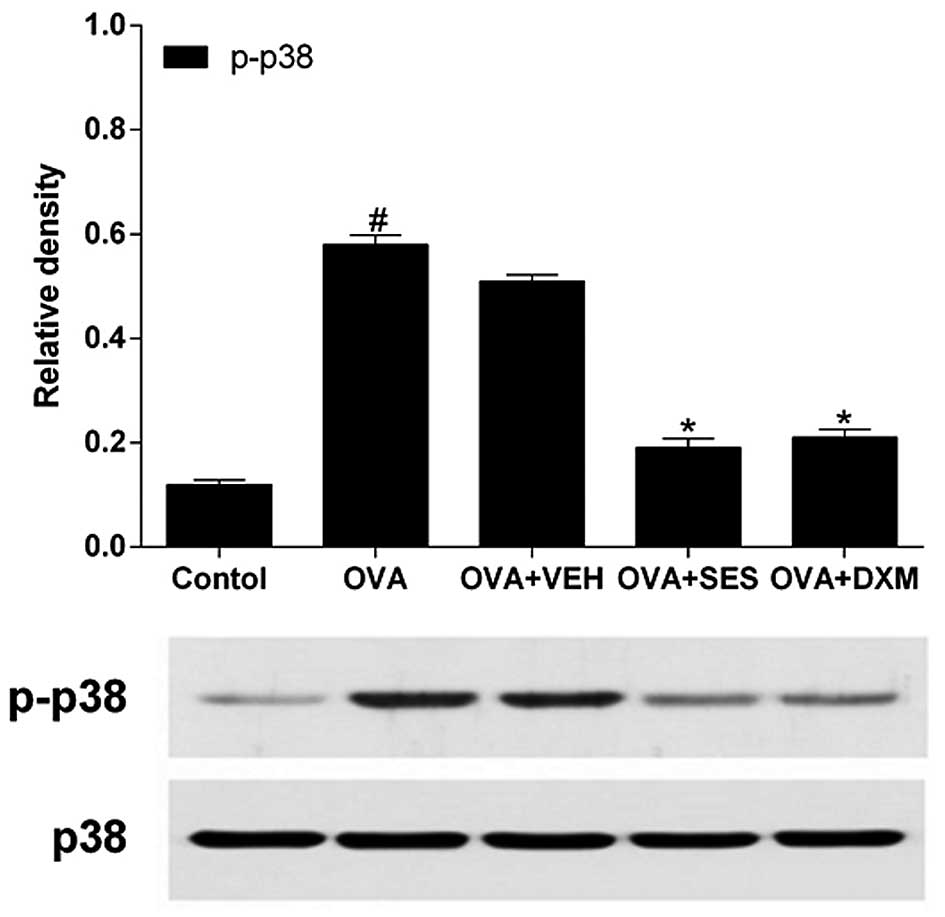|
1
|
Pascual RM and Peters SP: Airway
remodeling contributes to the progressive loss of lung function in
asthma: an overview. J Allergy Clin Immunol. 116:477–486. 2005.
View Article : Google Scholar : PubMed/NCBI
|
|
2
|
Kay AB: Asthma and inflammation. J Allergy
Clin Immunol. 87:893–910. 1991. View Article : Google Scholar : PubMed/NCBI
|
|
3
|
Janssen EM, van Oosterhout AJ, van Rensen
AJ, van Eden W, Nijkamp FP and Wauben MH: Modulation of Th2
responses by peptide analogues in a murine model of allergic
asthma: Amelioration or deterioration of the disease process
depends on the Th1 or Th2 skewing characteristics of the
therapeutic peptide. J Immunol. 164:580–588. 2000. View Article : Google Scholar : PubMed/NCBI
|
|
4
|
Mazzarella G, Bianco A, Catena E, De Palma
R and Abbate GF: Th1/Th2 lymphocyte polarization in asthma.
Allergy. 55:(Suppl 61). S6–S9. 2000. View Article : Google Scholar
|
|
5
|
Primhak RA and Powell CV: AHR in asthma.
Thorax. 57:186author reply 186. 2002. View Article : Google Scholar : PubMed/NCBI
|
|
6
|
Robinson DS, Hamid Q, Ying S, Tsicopoulos
A, Barkans J, Bentley AM, Corrigan C, Durham SR and Kay AB:
Predominant TH2-like bronchoalveolar T-lymphocyte population in
atopic asthma. N Engl J Med. 326:298–304. 1992. View Article : Google Scholar : PubMed/NCBI
|
|
7
|
Tournoy KG, Kips JC and Pauwels RA: Is Th1
the solution for Th2 in asthma? Clin Exp Allergy. 32:17–29. 2002.
View Article : Google Scholar : PubMed/NCBI
|
|
8
|
Kidd P: Th1/Th2 balance: The hypothesis,
its limitations, and implications for health and disease. Altern
Med Rev. 8:223–246. 2003.PubMed/NCBI
|
|
9
|
Umetsu DT, McIntire JJ, Akbari O, Macaubas
C and DeKruyff RH: Asthma: An epidemic of dysregulated immunity.
Nat Immunol. 3:715–720. 2002. View Article : Google Scholar : PubMed/NCBI
|
|
10
|
Bao Z, Guan S, Cheng C, Wu S, Wong SH,
Kemeny DM, Leung BP and Wong WS: A novel antiinflammatory role for
andrographolide in asthma via inhibition of the nuclear
factor-kappaB pathway. Am J Respir Crit Care Med. 179:657–665.
2009. View Article : Google Scholar : PubMed/NCBI
|
|
11
|
Janssen-Heininger YM, Poynter ME, Aesif
SW, Pantano C, Ather JL, Reynaert NL, Ckless K, Anathy V, van der
Velden J, Irvin CG and van der Vliet A: Nuclear factor kappaB,
airway epithelium and asthma: Avenues for redox control. Proc Am
Thorac Soc. 6:249–255. 2009. View Article : Google Scholar : PubMed/NCBI
|
|
12
|
Tully JE, Hoffman SM, Lahue KG, Nolin JD,
Anathy V, Lundblad LK, Daphtary N, Aliyeva M, Black KE, Dixon AE,
et al: Epithelial NF-κB orchestrates house dust mite-induced airway
inflammation, hyperresponsiveness, and fibrotic remodeling. J
Immunol. 191:5811–5821. 2013. View Article : Google Scholar : PubMed/NCBI
|
|
13
|
Ichikawa T, Sugiura H, Koarai A, Kikuchi
T, Hiramatsu M, Kawabata H, Akamatsu K, Hirano T, Nakanishi M,
Matsunaga K, et al: 25-hydroxycholesterol promotes
fibroblast-mediated tissue remodeling through NF-κB dependent
pathway. Exp Cell Res. 319:1176–1186. 2013. View Article : Google Scholar : PubMed/NCBI
|
|
14
|
Schieven GL: The biology of p38 kinase: A
central role in inflammation. Curr Top Med Chem. 5:921–928. 2005.
View Article : Google Scholar : PubMed/NCBI
|
|
15
|
Fu J, Meng X, He J and Gu J: Inhibition of
inflammation by a p38 MAP kinase targeted cell permeable peptide.
Med Chem. 4:597–604. 2008. View Article : Google Scholar : PubMed/NCBI
|
|
16
|
Saatian B, Zhao Y, He D, Georas SN,
Watkins T, Spannhake EW and Natarajan V: Transcriptional regulation
of lysophosphatidic acid-induced interleukin-8 expression and
secretion by p38 MAPK and JNK in human bronchial epithelial cells.
Biochem J. 393:657–668. 2006. View Article : Google Scholar : PubMed/NCBI
|
|
17
|
Saccani S, Pantano S and Natoli G:
p38-Dependent marking of inflammatory genes for increased NF-kappa
B recruitment. Nat Immunol. 3:69–75. 2002. View Article : Google Scholar : PubMed/NCBI
|
|
18
|
Woo CH, Lim JH and Kim JH:
Lipopolysaccharide induces matrix metalloproteinase-9 expression
via a mitochondrial reactive oxygen species-p38 kinase-activator
protein-1 pathway in Raw 264.7 cells. J Immunol. 173:6973–6980.
2004. View Article : Google Scholar : PubMed/NCBI
|
|
19
|
Nasirullah and Latha RB: Storage stability
of sunflower oil with added natural antioxidant concentrate from
sesame seed oil. J Oleo Sci. 58:453–459. 2009. View Article : Google Scholar : PubMed/NCBI
|
|
20
|
Yokota T, Matsuzaki Y, Koyama M, Hitomi T,
Kawanaka M, Enoki-Konishi M, Okuyama Y, Takayasu J, Nishino H,
Nishikawa A, Osawa T and Sakai T: Sesamin, a lignan of sesame,
down-regulates cyclin D1 protein expression in human tumor cells.
Cancer Sci. 98:1447–1453. 2007. View Article : Google Scholar : PubMed/NCBI
|
|
21
|
Utsunomiya T, Shimada M, Rikimaru T,
Hasegawa H, Yamashita Y, Hamatsu T, Yamasaki M, Kaku S, Yamada K
and Sugimachi K: Antioxidant and anti-inflammatory effects of a
diet supplemented with sesamin on hepatic ischemia-reperfusion
injury in rats. Hepatogastroenterology. 50:1609–1613.
2003.PubMed/NCBI
|
|
22
|
Chavali SR, Zhong WW and Forse RA: Dietary
alpha-linolenic acid increases TNF-alpha, and decreases IL-6, IL-10
in response to LPS: Effects of sesamin on the delta-5 desaturation
of omega6 and omega3 fatty acids in mice. Prostaglandins Leukot
Essent Fatty Acids. 58:185–191. 1998. View Article : Google Scholar : PubMed/NCBI
|
|
23
|
Iversen L, Fogh K and Kragballe K: Effect
of dihomogammalinolenic acid and its 15-lipoxygenase metabolite on
eicosanoid metabolism by human mononuclear leukocytes in vitro:
Selective inhibition of the 5-lipoxygenase pathway. Arch Dermatol
Res. 284:222–226. 1992. View Article : Google Scholar : PubMed/NCBI
|
|
24
|
Jeng KC, Hou RC, Wang JC and Ping LI:
Sesamin inhibits lipopolysaccharide-induced cytokine production by
suppression of p38 mitogen-activated protein kinase and nuclear
factor-kappaB. Immunol Lett. 97:101–106. 2005. View Article : Google Scholar : PubMed/NCBI
|
|
25
|
Phitak T, Pothacharoen P, Settakorn J,
Poompimol W, Caterson B and Kongtawelert P: Chondroprotective and
anti-inflammatory effects of sesamin. Phytochemistry. 80:77–88.
2012. View Article : Google Scholar : PubMed/NCBI
|
|
26
|
Bousquet J, Jeffery PK, Busse WW, Johnson
M and Vignola AM: Asthma. From bronchoconstriction to airways
inflammation and remodeling. Am J Respir Crit Care Med.
161:1720–1745. 2000. View Article : Google Scholar : PubMed/NCBI
|
|
27
|
Wegmann M: Th2 cells as targets for
therapeutic intervention in allergic bronchial asthma. Expert Rev
Mol Diagn. 9:85–100. 2009. View Article : Google Scholar : PubMed/NCBI
|
|
28
|
Holt PG and Sly PD: Th2 cytokines in the
asthma late-phase response. Lancet. 370:1396–1398. 2007. View Article : Google Scholar : PubMed/NCBI
|
|
29
|
Siebenlist U, Franzoso G and Brown K:
Structure, regulation and function of NF-kappa B. Annu Rev Cell
Biol. 10:405–455. 1994. View Article : Google Scholar : PubMed/NCBI
|
|
30
|
Baeuerle PA and Baltimore D: NF-kappa B:
Ten years after. Cell. 87:13–20. 1996. View Article : Google Scholar : PubMed/NCBI
|
|
31
|
Baldwin AS Jr: The NF-kappa B and I kappa
B proteins: New discoveries and insights. Annu Rev Immunol.
14:649–683. 1996. View Article : Google Scholar : PubMed/NCBI
|
|
32
|
Barnes PJ: Nuclear factor-kappa B. Int J
Biochem Cell Biol. 29:867–870. 1997. View Article : Google Scholar : PubMed/NCBI
|
|
33
|
Ray A, Siegel MD, Prefontaine KE and Ray
P: Anti-inflammation: Direct physical association and functional
antagonism between transcription factor NF-KB and the
glucocorticoid receptor. Chest. 107:(Suppl 3). S1391995. View Article : Google Scholar
|
|
34
|
Imanifooladi AA, Yazdani S and Nourani MR:
The role of nuclear factor-kappaB in inflammatory lung disease.
Inflamm Allergy Drug Targets. 9:197–205. 2010. View Article : Google Scholar : PubMed/NCBI
|
|
35
|
Schaeffer HJ and Weber MJ:
Mitogen-activated protein kinases: Specific messages from
ubiquitous messengers. Mol Cell Biol. 19:2435–2444. 1999.
View Article : Google Scholar : PubMed/NCBI
|
|
36
|
Davis RJ: Signal transduction by the JNK
group of MAP kinases. Cell. 103:239–252. 2000. View Article : Google Scholar : PubMed/NCBI
|
|
37
|
Han J and Ulevitch RJ: Emerging targets
for anti-inflammatory therapy. Nat Cell Biol. 1:E39–E40. 1999.
View Article : Google Scholar : PubMed/NCBI
|
|
38
|
Kumar A, Lnu S, Malya R, Barron D, Moore
J, Corry DB and Boriek AM: Mechanical stretch activates nuclear
factor-kappaB, activator protein-1, and mitogen-activated protein
kinases in lung parenchyma: Implications in asthma. FASEB J.
17:1800–1811. 2003. View Article : Google Scholar : PubMed/NCBI
|
|
39
|
Taube C, Nick JA, Siegmund B, Duez C,
Takeda K, Rha YH, Park JW, Joetham A, Poch K, Dakhama A, Dinarello
CA and Gelfand EW: Inhibition of early airway neutrophilia does not
affect development of airway hyperresponsiveness. Am J Respir Cell
Mol Biol. 30:837–843. 2004. View Article : Google Scholar : PubMed/NCBI
|
|
40
|
Underwood DC, Osborn RR, Kotzer CJ, Adams
JL, Lee JC, Webb EF, Carpenter DC, Bochnowicz S, Thomas HC, Hay DW
and Griswold DE: SB 239063, a potent p38 MAP kinase inhibitor,
reduces inflammatory cytokine production, airways eosinophil
infiltration, and persistence. J Pharmacol Exp The. 293:281–288.
2000.
|
|
41
|
Duan W, Chan JH, McKay K, Crosby JR, Choo
HH, Leung BP, Karras JG and Wong WS: Inhaled p38alpha
mitogen-activated protein kinase antisense oligonucleotide
attenuates asthma in mice. Am J Respir Crit Care Med. 171:571–578.
2005. View Article : Google Scholar : PubMed/NCBI
|















